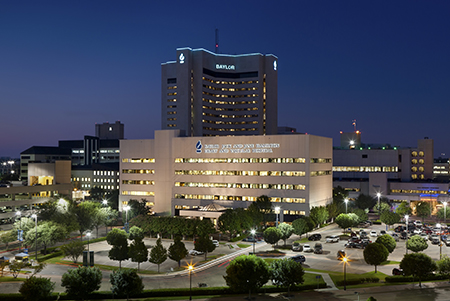
A clinical trial exploring a new minimally invasive treatment option for some patients with severe aortic stenosis recently launched at Baylor Jack and Jane Hamilton Heart and Vascular Hospital† . The investigational treatment option is for patients who might have been previously deemed unable to have transcatheter aortic valve replacement (TAVR) due to the large size of their diseased valves.
The Medtronic CoreValve® Evolut® R 34mm System, which features a larger TAVR technology than previous versions, replaces a diseased aortic heart valve through a minimally invasive procedure, without open-heart surgery and without surgical removal of the diseased valve. The device is typically inserted through an artery in the leg and then guided through the arteries into the heart. Once in place, the device expands and takes over the original valve's function to enable oxygen-rich blood to flow efficiently out of the heart.
Aortic stenosis is a common heart problem caused by a narrowing of the heart's aortic valve due to excessive calcium deposited on the valve leaflets. When the valve narrows, it does not open or close properly, making the heart work harder to pump blood throughout the body. Eventually, this causes the heart to weaken and function poorly, which may lead to heart failure and increased risk for sudden cardiac death.
The investigative larger size CoreValve ® Evolut R® System – the Evolut R 34mm System -- is a recapturable, self-expanding transcatheter aortic valve replacement technology designed to treat severe aortic stenosis in patients with a larger valve structure.
Around 60 patients at up to 15 clinical sites will be enrolled in the prospective, single-arm Medtronic Evolut 34R US Clinical Study. This research is a collaborative effort for Baylor Heart and Vascular Services at Dallas and interventional cardiologists and cardiothoracic surgeons who are designated TAVR team members.
"Our rich history and tradition of being on the forefront of cardiac care continues with this new clinical trial," says Robert Stoler, MD, co-medical director of cardiology and medical director of the cardiac catheterization laboratory at Baylor Heart and Vascular Hospital l†, and a researcher for Baylor Scott & White Research Institute. "Our patient outcomes and quality care continue to garner national attention. We are pleased to be one of seven clinical sites chosen for this study."
The study is led locally by principal investigators Stoler and cardiothoracic surgeon Robert Hebeler, MD, who were joined today by TAVR team member and cardiothoracic surgeon A. Carl Henry, MD. All three physicians are on the medical staff at Baylor Hamilton Heart and Vascular Hospital l† and Baylor University Medical Center at Dallas.
About Baylor Heart and Vascular Services at Dallas
Baylor University Medical Center at Dallas offers cardiovascular and thoracic care in two locations to meet patients' needs. Open heart surgery, cardiac surgery, LVAD and heart transplants, in addition to thoracic surgery, are performed at Baylor University Medical Center. For more information about Baylor University Medical Center, visit www.BaylorHealth.com/Dallas
Baylor Jack and Jane Hamilton Heart and Vascular Hospital l† is located on the main campus of Baylor Dallas and provides heart and vascular care and procedures, including diagnostic, interventional, surgical, imaging and rehabilitative services, as well as wellness and prevention support. For more information about Baylor Heart and Vascular Hospital, visit: www.BaylorHeartHospital.com
(updated January 2016)
† Joint ownership with physicians.
Notice Regarding Physician Ownership: Baylor Jack and Jane Hamilton Heart and Vascular Hospital is a hospital in which physicians have an ownership or investment interest. The list of the physician owners or investors is available to you upon request. Physicians are members of the medical staff at one of Baylor Scott & White Health's subsidiary, community or affiliated medical centers and are neither employees nor agents of those medical centers, Baylor Health Care System, Scott & White Healthcare or Baylor Scott & White Health.
# # #
MEDIA CONTACT:
Susan Hall
Susan.Hall@BSWHealth.org
214.820.1817
About Baylor Scott & White Health
As the largest not-for-profit health system in the state of Texas, Baylor Scott & White promotes the health and well-being of every individual, family and community it serves. It is committed to making quality care more accessible, convenient and affordable through its integrated delivery network, which includes the Baylor Scott & White Health Plan, Baylor Scott & White Research Institute, the Baylor Scott & White Quality Alliance and its leading digital health platform – MyBSWHealth. Through 51 hospitals and more than 1,200 access points, including flagship academic medical centers in Dallas, Fort Worth and Temple, the system offers the full continuum of care, from primary to award-winning specialty care. Founded as a Christian ministry of healing more than a century ago, Baylor Scott & White today serves more than three million Texans. For more information, visit: BSWHealth.com
